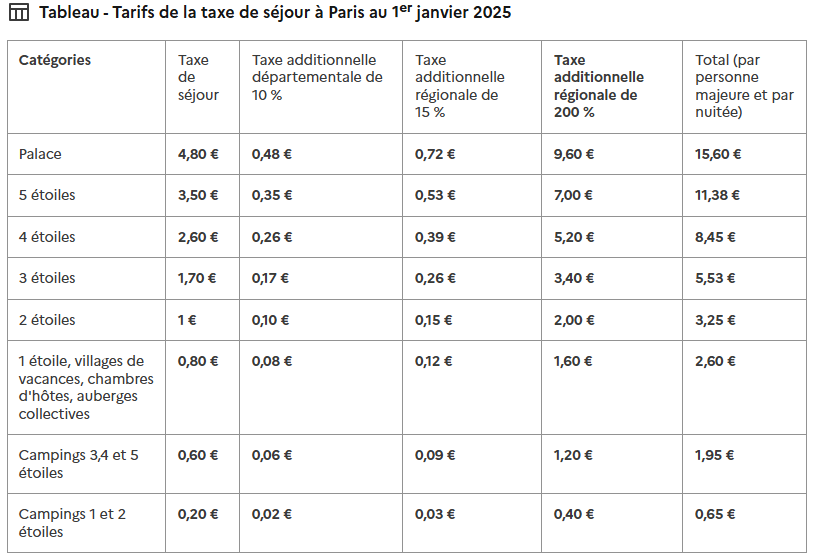La taxe de séjour est une contribution locale collectée auprès des visiteurs séjournant à titre onéreux dans un hébergement touristique. Elle permet de financer le développement et la promotion du tourisme sur le territoire. En 2025, certaines évolutions – notamment en Île-de-France – nécessitent l’attention des hôteliers.
Voici l’essentiel à retenir.
Qu'est-ce que la taxe de séjour ?
La taxe de séjour est un impôt local, institué par les communes ou intercommunalités, payé par les voyageurs séjournant dans un hébergement touristique (hôtel, résidence, meublé, etc.). Elle est collectée par l’hébergeur, qui la reverse à la collectivité. Les recettes financent des actions liées à l’accueil et à l’attractivité touristique.
Quels sont les tarifs applicables en 2025 ?
Les tarifs varient selon :
- la catégorie d’hébergement,
- la commune d’implantation,
- et parfois, la saison.
Chaque année, un barème national encadre les montants, que les collectivités fixent librement dans cette limite.

Source : Service Public
Pour connaître les tarifs exacts de la taxe de séjour applicables à votre établissement, consultez le site officiel de votre mairie ou de votre office de tourisme.
Quelles sont les spécificités pour les hébergements non classés ?
Pour les hébergements non classés ou en attente de classement, le tarif est proportionnel au prix HT de la nuitée :
5 % du coût HT par personne, dans la limite d’un plafond équivalent au tarif le plus élevé localement (ex : 15,60 € à Paris).

Quelles sont les évolutions prévues en Île-de-France ?
Depuis le 1er janvier 2024, une surtaxe régionale de 200 % s’ajoute à la taxe de séjour en Île-de-France.
Elle s’applique de façon automatique sur tous les hébergements soumis à la taxe de séjour, et finance les infrastructures de transport (notamment en vue des JO 2024 et au-delà).
👉 Exemple :
Un hôtel 4 étoiles à Paris applique une taxe de 3,25 € → la surtaxe est de 6,50 € → total : 9,75 € par nuitée et par personne.
Qui est exonéré de la taxe de séjour ?
Certaines personnes sont dispensées du paiement de la taxe de séjour :
- Les mineurs (moins de 18 ans),
- Les travailleurs saisonniers employés dans la commune,
- Les personnes hébergées à titre gratuit dans le cadre de dispositifs d’urgence ou de relogement temporaire,
- Les personnes occupant un logement dont le loyer est très modéré (plafond défini localement).

Comment déclarer et reverser la taxe de séjour ?
Les hébergeurs sont responsables de la collecte de la taxe de séjour auprès de leurs clients et doivent la reverser aux collectivités locales selon les modalités définies par celles-ci.
À Paris, par exemple, la déclaration et le paiement se font en ligne via une plateforme dédiée. Il est essentiel de se renseigner auprès de sa mairie ou de l'établissement public de coopération intercommunale (EPCI) compétent pour connaître les procédures spécifiques à chaque territoire.
Source : Ville de Paris
Quelles sont les sanctions en cas de non-paiement ?
Le non-paiement ou le retard dans le versement de la taxe de séjour peut entraîner des sanctions pour l'hébergeur, notamment des intérêts de retard et, en cas de non-régularisation, une procédure de taxation d'office après mise en demeure. Il est donc crucial de respecter les obligations déclaratives et de paiement pour éviter toute pénalité.
Conclusion
En 2025, la taxe de séjour reste un levier important pour soutenir le tourisme local. Entre évolutions tarifaires, surtaxe en Île-de-France et responsabilités renforcées des hébergeurs, il est crucial de rester informé et conforme.Nous vous recommandons de consulter régulièrement les délibérations de votre commune et de mettre à jour vos outils de gestion pour intégrer les bons taux.






.jpg)

